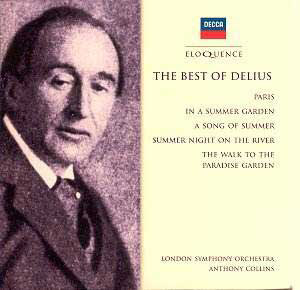Anthony Collins led the violas of the London Symphony Orchestra
for a period between the two Wars, having already done so at Covent Garden.
His late decision to become a conductor led to work with the Carl Rosa
and Sadler’s Wells before a move to America saw him composing film music
for RKO. Return to his native country after the War was relatively brief
and he went back to America where he died in 1964. Collins has become
best known for his Sibelius cycle but he recorded a slew of Bantock (for
Paxton - or was that Walter Collins?), Elgar, Walton – an unforgettable
Façade - and Britten, Mozart and Strauss with Gulda, Paganini
with Ricci, Mendelssohn with Katin and much else, though precious few
genuinely big undertakings on the scale of the Sibelius Symphonies. I’ve
yet to hear a Collins record I’ve not liked and admired.
The contents of this Delius Decca Eloquence are also available domestically on Decca’s British Music Collection where it forms part of a double CD set which includes Shirley-Quirk’s Sea Drift, Lloyd Webber and Forsberg playing the Cello Sonata, Mackerras’s A Song of the High Hills, and some of Marriner’s 1977 miniatures. If however you prefer to isolate and distil the essence of Collins’ superb and entirely idiomatic readings you couldn’t do better than invest in this exceptionally inexpensive Decca Eloquence. The prize of the collection is Paris. From the opening, with its sepulchral basses, to the final moments of ecstatic exultation Collins traverses nearly twenty-four minutes of a perilous score with utter conviction. The slowly flecked life of the introduction is given shape and meaning, Collins is sovereign at assimilating the disparate elements of the score and at 9’47 encourages swirling strings and strong rhythmic delineation. This is powerfully alive Delius conducting with the basses well shaped and onrushing passions subsumed into the vital spine of the argument. Nothing is allowed to sag. Particularly felicitous is the sweet toned violin solo and the sectional integrity of the woodwinds before 13’10. Whether scintillating, dancing or glowering this Paris is viscerally alive, with effortless weight cushioning it and leading to a conclusion made inevitable and moving through Collins’ command of structure and tonal nuance. He is equally adept in the other pieces; there’s not one disappointment here. In a Summer Garden flows with Elysian logic; Collins gives a delicious fillip to the violins’ line at 4’20 after the verdant woodwind solos. The lower strings possess a subtle density at 4’58 as the winds’ hypnotic line course through the fabric of the work. Summer Night on the River possesses all the languorous sensuality one could wish for and The Walk to the Paradise Garden bursts into a superbly judged climax, with an ending of prodigal weightlessness yet with a sustained bass line. Collins brings a yearning elegance to the strings at 3’15 in A Song of Summer. At 6’34 there is tremendous poignancy yet strength to Collins’ phrasing, an admixture of pliancy and definable string shaping.
Yes, these are 1953-54 monos; yes the percussion is rather airless in Paris. No, there’s not a luxuriant bloom to the strings. Perhaps some of the climaxes are still a little congested. But to listen to Collins’ Delius is truly to understand a little better the nature of his orchestral genius and to absorb a beauty born of a conductor’s selfless gifts.
Jonathan Woolf


